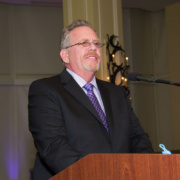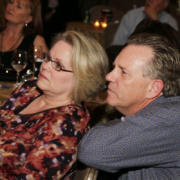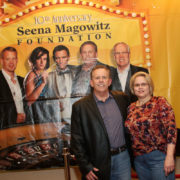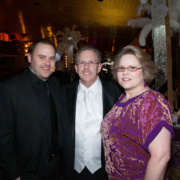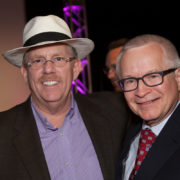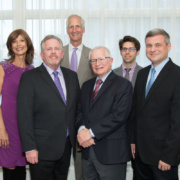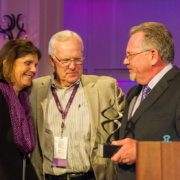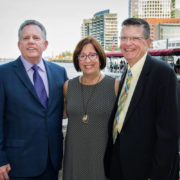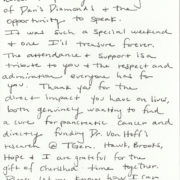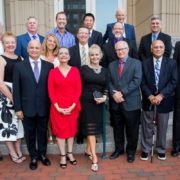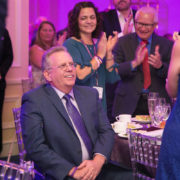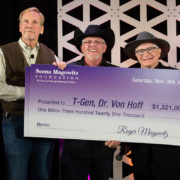A Philanthropist Fights Pancreatic Cancer

- Photo/Reba Saldanha August 26, 2018
ROGER E. MAGOWITZ
Founder and CEO of The Seena Magowitz Foundation
The founder of the Seena Magowitz Foundation has a lifelong appreciation of charity
To those who know him, it may be a surprise to learn that Roger E. Magowitz struggled with any task. After all, the founder of the Seena Magowitz Foundation has raised more than $12 million for pancreatic cancer research in the past 15 years—after an impressive career in the bedding industry, where he built a brand and sold it to the largest mattress retailer in the U.S.
But the challenges Roger encountered after enlisting in the Marines following high school graduation probably helped propel him toward entrepreneurship. And the success of his own business, along with the example of charitable giving set by some of his closest relatives, enabled him to start a foundation in his mother’s memory that is improving the lives of increasing numbers of pancreatic cancer patients.
Born in Monticello, New York, Roger moved with his mom and his brother to her parents’ home in Brooklyn after his parents divorced when he was 2. “My relationship with my mom strengthened because of the divorce,” he said. “I stayed close with her for the rest of her life.”
They shared his grandparents’ house with Roger’s aunt and her husband and children. It was a large, loving, supportive family, he said. His mom, aunt and grandmother still found time to establish a charity called The Friendly Group for Cancer Research, which benefited a local hospital. “Growing up, I always remember hearing about the importance of charity,” Roger said.
An Atypical Journey After High School
Because Roger was never a big fan of being a student, college wasn’t in his plans, but he knew his mom would never approve of him simply taking whatever low-level job he could get after high school. Many members of his extended family members were lawyers, teachers and doctors.
So he enlisted in the Marines and after boot camp, his high test scores had given him the opportunity to study aviation electronics in Millington, Tennessee. “But I failed miserably,” he said. “I’m not handy and dealing with electronics requires being able to work well with your hands and work well with tools.” He was then assigned to the “crash crew,” whose members sat around on a runway waiting to help an aircraft that might be in trouble. “We were cleaning trucks just waiting for something to happen,” Roger said.
After that, he was sent to Japan for about a year. Fortunately for him (at least in hindsight), Roger couldn’t meet the very strict weight restriction imposed by the Marines, so he was honorably discharged. “Basically I ate my way out of the Marines,” he said.
‘Bedrock’ of Success
After he left the military, he moved to Maryland to work with his father in the furniture business for about six months. Then he started working for a company called Mattress Discounters and he realized he had a talent for sales. After just nine months on the job and at the age of 22, management asked him to open up locations in a new market—Virginia Beach, Virginia. Roger managed those stores for a couple of years, but then the owner wanted to sell them. When the initial sale fell through in 1980, Roger decided with his wife Jeanne that he wanted to try to buy the retail stores. The purchase price: $150,000, about half of which he financed with credit cards and loans from family. He was able to pay the owners the balance of the purchase price over a longer period of time.
In 1995, Roger and Jeanne moved to the Phoenix area. “I wanted to grow my business but didn’t have the capital,” Roger said. “I was good friends with the president of the Simmons mattress company and told him I was willing to open stores to sell his company’s product anywhere in the country they needed help. He suggested Phoenix and I said I was in. We didn’t know a soul here.” Licensing restrictions prompted him to change the name of the company to Metropolitan Mattress and he added 18 locations in the Valley.
About a decade later, he established another retail bedding store, Bedroom Eyes, that sold high-end and luxury hand-sewn Vi-Spring mattresses imported from London.
Life Forever Changed
Just a few years after opening the luxury store, Roger’s world was rocked by a devastating development. His beloved mother Seena had moved to the Valley in 1996 and was enjoying life as a retiree. But in early 2001, at just 63, she began showing signs of jaundice. After undergoing surgery, she learned she had pancreatic cancer and doctors could offer no treatment to extend her life beyond several months.
It was about that time that Roger stopped wearing a watch and to this day, he refuses to wear one. “Time became my enemy, so I took off my watch,” he said. “I couldn’t wear a watch because it was like watching time move too quickly. Watching the hands of a clock clicking and ticking meant losing the person I loved most in the world,” he said, adding that he’s hopeful that one day there will be a cure for pancreatic cancer and he will feel comfortable wearing a watch again.
“My mother lived only five months after diagnosis,” Roger said. Seena Magowitz passed away on June 24, 2001.
The Beginnings of the Seena Magowitz Foundation
After enduring a year of depression, Roger knew it was time to do something to honor the memory of his mother. He found information online about a golf tournament that was being held to raise money for pancreatic cancer. With Roger’s help, $10,000 was raised to benefit pancreatic cancer research. But he knew much more could be raised. The next year’s golf tournament was named for Roger’s mother. “That year, we raised $50,000,” Roger said, adding that he managed 90 percent of all of the tasks associated with hosting the golf tournament.
Those sponsoring the tournament wanted a different person’s name associated with the tournament the following year rather than the name Seena Magowitz, so Roger decided to sponsor his own fundraising golf tournament. That tourney raised about $75,000 and Roger was motivated at that point to establish the Seena Magowitz Foundation.
Shortly after that, Roger met Dr. Daniel Von Hoff, M.D., F.A.C.P., a pioneer in the development of targeted therapies for treatment of cancer at the Translational Genomics Research Institute (TGen) in Phoenix and HonorHealth Research Institute in Scottsdale. Roger decided after that productive meeting that all money the Foundation raised for pancreatic cancer research would be earmarked for TGen.
Success Begets Success
Now, 15 years later, the Seena Magowitz Foundation has raised more than $12 million for pancreatic cancer research. Every year, the Seena Magowitz Annual Golf Classic is usually held during the last weekend of August.
You might think that a foundation with that kind of track record has many full-time employees, but it’s not the case. The Scottsdale-based Seena Magowitz Foundation does not have a single salaried employee, and only three people work full-time with the Foundation on a volunteer basis: Roger; social media and marketing expert Tony Subia; and accounting professional Liz McBeth, who lives in Virginia and manages the financial aspects of the Foundation remotely as well as all of the administrative aspects of the Annual Golf Classic. “I couldn’t do what we need to do without Tony and Liz,” Roger said. “I greatly appreciate their dedication to the Foundation.”
He’s also grateful for his wife’s support. “As I’ve tried to do my part in conquering the world’s deadliest cancer,” Roger said, “my wife Jeanne has stood by my side and continually encouraged me in this endeavor.”
He said the Foundation also wouldn’t be as successful without the support of the furniture industry and the mattress industry specifically. In 2010, Roger sold his mattress company to Mattress Firm, in large part because Mattress Firm Executive Chairman Steve Stagner agreed to help champion pancreatic cancer research. “On a handshake, Steve said he would donate money to the cause,” Roger said. “To date, Mattress Firm is the Foundation’s largest corporate donor. That handshake was a changing moment in the Foundation’s history.”
Roger also is grateful to Furniture Today Magazine and its executive editor David Perry for their support and to many, many other pancreatic cancer “advocates”—those who have generously supported the Foundation. They include Karl Glassman, CEO of Leggett & Platt in Carthage, Missouri; Gary Fazio, the retired CEO of Serta Simmons Bedding philanthropist and pancreatic cancer survivor Howard Young; entrepreneur John Morley; Randy Dobbs, a philanthropist and father of pancreatic cancer survivor Elizabeth O’Connor; and Jai Pausch.
Jai is the widow of Carnegie Mellon Professor Randy Pausch, who passed away from pancreatic cancer in 2008. A few months after Randy passed away in July of that year, Roger went to a fundraising event where a copy of Randy’s best-selling book “The Last Lecture” containing his original autograph was to be auctioned off. Roger was the winning bidder for the book, even though Jai was bidding on the book, too, unbeknownst to Roger. Afterward, he and Jeanne became good friends with Jai who has been a supporter of the Seena Magowitz Foundation ever since.


